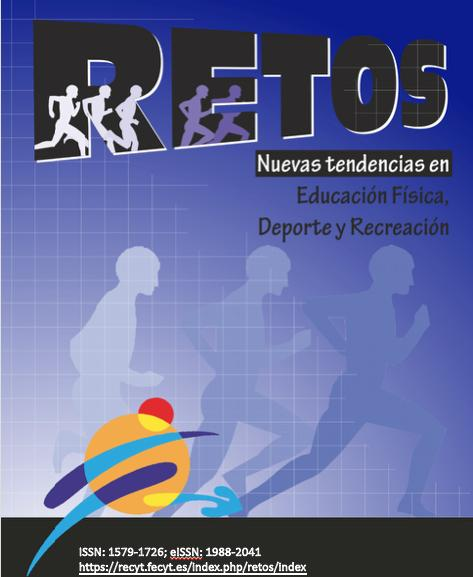Professional football as a platform for social inclusion: an experience of intervention in Ciudad Juárez, Mexico
DOI:
https://doi.org/10.47197/retos.v49.98640Keywords:
social intervention, football, inclusion, education, sportAbstract
This article presents an experience of intervention through sport, carried out with FC Juárez players (Ciudad Juárez, México), aimed at helping athletes to reconcile the sporting and academic-family environment, to promote their personal growth through education in values and to promote intervention itineraries to provide individualised support to these players as part of the process of personal and academic development in the context of social intervention. This intervention, based on a systemic perspective of the player-family binomial, included activities focused on the player, his family and the coaching staff. The article concludes with the main results of the intervention in the sporting, academic and socio-community spheres.
Keywords: social intervention; football; inclusion; education; sport.
References
Castro-Saucedo, L.K., García-Cadena, C. y López-Estrada, R.E. (2020). Exclusión social, inclusión política y autoestima de jóvenes en pobreza, Monterrey, México. Revista de Ciencias Sociales, 26(1), 38-50.
Davis, L, Jowett, S. y Tafvelin, S. (2019). Communication strategies: the fuel for quality coach-athlete relationships and athlete satisfaction. Frontiers in Psychology, 10(2156). https://doi.org/10.3389/fpsyg.2019.02156
Delgado, Y., Santana, L. y Feliciano L.A. (2019). Proyectos de vida en adolescentes en riesgo de exclusión social. Revista de investigación educativa, 38(1), 149-165, https://doi.org/10.6018/rie.332231
Espinal, I., Gimeno, A., y González, F. (2006). El enfoque sistémico en los estudios sobre la familia. Revista internacional de sistemas, 14(4), 21-34.
Fernández-Chico, J.M. (2019). Aproximaciones a formas de organización y acción política en espacios de exclusión social desde una mirada de la antropología política: análisis de un polígono al suroriente de Ciudad Juárez, en la frontera norte de México. Religación, revista de ciencias sociales y humanidades, 4(13), 60-69.
Fernández-Gavira, J., Jiménez-Sánchez, M.B. y Fernández-Truan, J.C. (2018). Deporte e inclusión social: aplicación del Programa de Responsabilidad Personal y Social en adolescentes. Revista de Humanidades, 34, 39-58.
Fernández-Gavira, J., Huete, M. y Vélez, L. (2017). Vulnerable groups at risk for sport and social exclusion. Journal of Physical Education and Sport, 17(1), pp. 312 – 326. https://doi.org/10.7752/jpes.2017.01047
Garciandia J.A. (2011). Pensar sistémico: una introducción al pensamiento sistémico. Editorial Pontificia Universidad Javeriana.
Ginesta-Portet, X. (2011). Football and the Global Entertainment Business. Clubs as Entertainment Multinational Corpora-tions. Comunicación y sociedad, 24(1), 141-166.
Hellison, D. (2010). Teaching personal and social responsibility through physical activity. Human Kinetics.
Jiménez, P. y Durán, J. (2005). Actividad física y deporte en jóvenes en riesgo: educación en valores. Apunts, Educación Física y Deportes, 80, 13-19.
López-Chamorro, J.M., Torregrosa, M., Sánchez-Oliva, D. y Amado-Alonso, D. (2016). El fútbol dentro del campo y fuera de él: desafíos en la transición a la élite. Revista de Psicología del Deporte, 25(1), 81-89.
Martín-García, M.J. y Vila-Mumbrú, C. (2020). Prácticas para facilitar el empoderamiento de los jóvenes en riesgo de ex-clusión. En T. Lleixá Arribas, Z. Bozu y A. Aneas Álvarez (Eds.), Educación 2020-2022. Retos, tendencias y compromisos (pp. 35-40). Universitat de Barcelona.
Palomar, M. y Suárez, E. (1993). El modelo sistémico en el trabajo social familiar: Consideraciones teóricas y orientaciones prácticas. Alternativas, Cuadernos de trabajo social, 1(2), 169-184.
Petisco-Rodríguez C, Sánchez-Sánchez LC, Fernández-García R, Sánchez-Sánchez J, García-Montes JM. (2020). Disor-dered Eating Attitudes, Anxiety, Self-Esteem and Perfectionism in Young Athletes and Non-Athletes. International Jour-nal of Environmental Research and Public Health, 17(18), 6754. https://doi.org/10.3390/ijerph17186754
Plan Estratégico de Ciudad Juárez. (20 de octubre de 2022). Índice de estado de derecho en Ciudad Juárez. https://planjuarez.org/documentos/rueda-de-prensa-informe-de-estado-de-derecho-2022/.
Ríos, M. (2005). La Educación Física como componente socializador en la inclusión del alumnado con discapacidad motriz. Estudio de casos en la etapa de educación primaria. Tesis Doctoral. Barcelona: Universidad de Barcelona. http://www.tesisenxarxa.net/TDX-0104106-085807/
Santos, F., Corte-Real, N., Regueiras, L., Dias, C. y Fonseca, A. (2017). Personal and social responsibility development: exploring the perceptions of Portuguese Youth football coaches within competitive youth sport. Sports Coaching Review, 6(1), 108-125. https://doi.org/10.1080/21640629.2016.1249643
Schaillée, H., Haudenhuyse, R. y Bradt, L. (2019) Community sport and social inclusion: international perspectives. Sport in Society, 22(6), 885-896. https://doi.org/10.1080/17430437.2019.1565380
Vila Surez, M.E. (2013). Deportes de equipo. Comprender la complejidad para elevar el rendimiento. Cultura, Ciencia Y Deporte, 1(3), 171-173. https://doi.org/10.12800/ccd.v1i3.289
Downloads
Published
How to Cite
Issue
Section
License
Copyright (c) 2023 Retos

This work is licensed under a Creative Commons Attribution-NonCommercial-NoDerivatives 4.0 International License.
Authors who publish with this journal agree to the following terms:
- Authors retain copyright and ensure the magazine the right to be the first publication of the work as licensed under a Creative Commons Attribution License that allows others to share the work with an acknowledgment of authorship of the work and the initial publication in this magazine.
- Authors can establish separate additional agreements for non-exclusive distribution of the version of the work published in the journal (eg, to an institutional repository or publish it in a book), with an acknowledgment of its initial publication in this journal.
- Is allowed and authors are encouraged to disseminate their work electronically (eg, in institutional repositories or on their own website) prior to and during the submission process, as it can lead to productive exchanges, as well as to a subpoena more Early and more of published work (See The Effect of Open Access) (in English).
This journal provides immediate open access to its content (BOAI, http://legacy.earlham.edu/~peters/fos/boaifaq.htm#openaccess) on the principle that making research freely available to the public supports a greater global exchange of knowledge. The authors may download the papers from the journal website, or will be provided with the PDF version of the article via e-mail.


